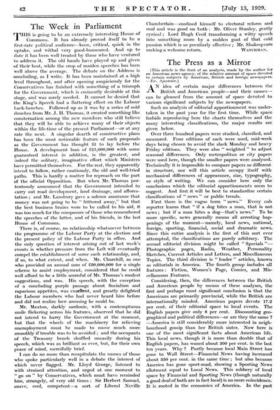The Week in Parliament
THIS is going to be an extremely interesting House of Commons. It has already proved itself to be a first-rate political audience—keen, critical, quick in the uptake, and withal very good-humoured. And up to date it has been well treated by those who have ventured to address it. The old hands have played up and given of their best, while the crop of maiden speeches has been well above the average. The debate on the Address is concluding, as I write. It has been maintained at a high level throughout, and after opening auspiciously for the Conservatives has finished with something of a triumph for the Government, which is eminently desirable at this stage, and was sorely needed. It cannot be denied that the King's Speech had a flattering effect on the Labour back-benches. Followed up as it was by a series of cold douches from Mr. J. H. Thomas, it created something like consternation among the new members who still believe that they will be able to achieve many of their objects within the life-time of the present Parliament—or at any rate the next. A singular dearth of constructive plans has been the most noticeable feature of such proposals as the Government has thought fit to lay before the House. A development loan of £25,000,000 with some guaranteed interest in addition, is the greatest, and indeed the solitary, imaginative effort which Ministers have permitted themselves. For the rest, they apparently intend to follow, rather cautiously, the old and well-tried paths. This is hardly a matter for reproach on the part of the official Opposition. But when Mr. Thomas por- tentously announced that the Government intended to carry out road development, land drainage, and affores- tation ; and Mr. Lansbury gave a solemn assurance that Money was not going to be " frittered away," but that the best business brains were to be called to his aid, it was too much for the composure of those who remembered the speeches of the latter, and of his friends, in the last House of Commons.
There is, of course, no relationship whatsoever between the programme of the Labour Party at the election and the present policy of the Labour Party in office. And the only question of interest arising out of last week's events is whether pressure from the Left will eventually compel the establishment of some such relationship, and, if so, to what extent, and when. Mr. Churchill, as one who provided an annual sum of £80,000,000 for a single scheme to assist employment, considered that he could well afford to be a little scornful of Mr. Thomas's modest suggestions, and was. His speech, with the exception of a concluding purple passage about Socialism and rapacious appetites, was excellent, and greatly delighted the Labour members who had never heard him before and did not realize how amusing he could be.
Mr. Maxton, darkly sardonic, with a contemptuous smile flickering across his features, observed that he did not intend to harry the Government at the moment, but that the wheels of the machinery for relieving unemployment must be made to move much more smoothly if trouble was to be avoided ; and the occupants of the Treasury bench shuffled uneasily during his speech, which was as brilliant as ever, but, for their own peace of mind, mercifully brief.
I can do no more than recapitulate the names of those who spoke particularly well in a debate the interest of Which never flagged. Mr. Lloyd George, listened to with strained attention, and urged at one moment to " go on " by Conservatives, which must have reminded him, strangely, of very old times : Sir Herbert Samuel, suave, cool, competent—a sort of Liberal Neville . Chamberlain—confined himself to electoral reform and coal and was good on both : Mr. Oliver Stanley, gently cynical ; Lord Hugh Cecil transforming a witty speech- into something more by a sudden gust of that cold passion which is so peculiarly effective ; Mr. Shakespeare.
































 Previous page
Previous page